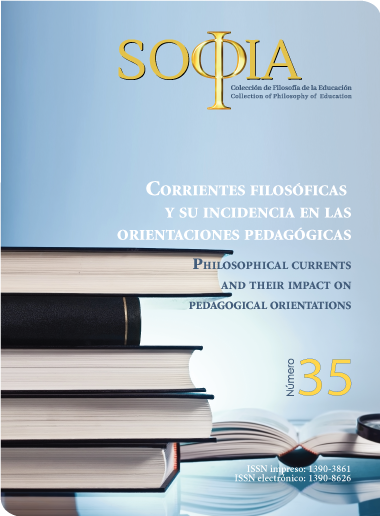Kantian perspective on the state and education
Main Article Content
Abstract
Article Details

This work is licensed under a Creative Commons Attribution-NonCommercial-ShareAlike 4.0 International License.
Authorship: The list of authors signing must include only those people who have contributed intellectually to the development of the work. Collaboration in the collection of data is not, by itself, a sufficient criterion of authorship. "Sophia" declines any responsibility for possible conflicts arising from the authorship of the works that are published.
Copyright: The Salesian Polytechnic University preserves the copyrights of the published articles, and favors and allows their reuse under the Creative Commons Attribution-NonCommercial-ShareAlike 3.0 Ecuador license. They may be copied, used, disseminated, transmitted and publicly displayed, provided that: i) the authorship and the original source of their publication (journal, editorial and work URL) are cited; (Ii) are not used for commercial purposes; Iii) mention the existence and specifications of this license.
References
Eco, Umberto. (2010). El nombre de la rosa. Barcelona: Debolsillo.
Granja Castro, D.M. y G. Leyva (eds.). (2008). Cosmopolitismo, globalización y democracia: Retos de la Filosofía Política de Hoy. Barcelona: Gedisa.
Kant, Immanuel. (1991). Transición de los principios metafísicos de la ciencia natural a la física. (Opus postumum). Barcelona: Anthropos.
_____ (1999). La metafísica de las costumbres (3a ed.). Estudio preliminar de Adela Cortina Orts. Traducción y notas de Adela Cortina Orts y Jesús Conill Sancho. Madrid: Tecnos. Clásicos del Pensamiento.
_____ (2003). Pedagogía. Madrid: Akal.
_____ (2004a). Antropología práctica (según el manuscrito inédito de C.C. Mrongovius, fechado en 1785). Edición preparada por Roberto Rodríguez Aramayo. Madrid: Tecnos. Clásicos del Pensamiento.
_____ (2004). El conflicto de las facultades. Traducción de Elsa Taberning. Buenos Aires: Losada. Biblioteca de Obras Maestras del Pensamiento.
_____ (2006). Idea para una historia universal en clave cosmopolita. Presentación de Dulce María Granja Castro. México: UNAM. Colección pequeños grandes ensayos.
Llano Alonso, Fernando H. (2002). El humanismo cosmopolita de Immanuel Kant. Madrid: Dykinson. Instituto de Derechos Humanos Bartolomé de las Casas. Universidad Carlos III de Madrid.
Nussbaum, Martha C. (1999). Los límites del patriotismo. Identidad, pertenencia y “ciudadanía mundial”. Compilado por Joshua Cohen. Traducción de Carme Castells. Barcelona: Paidós.
_____ (2007). Las fronteras de la justicia. Consideraciones sobre la exclusión. Traducción de Ramon Vilà Vernis (caps. I-IV) y Albino Santos Mosquera (caps. V-VII). Barcelona: Paidós.
Rodríguez Aramayo F. 1989. Reflexiones sobre antropología. En Kant. ed. de Roberto Rodríguez Aramayo, Península, Barcelona.
Walzer, Michael. (1998). Tratado sobre la tolerancia. Traducción de Francisco Álvarez. Barcelona: Paidós.

